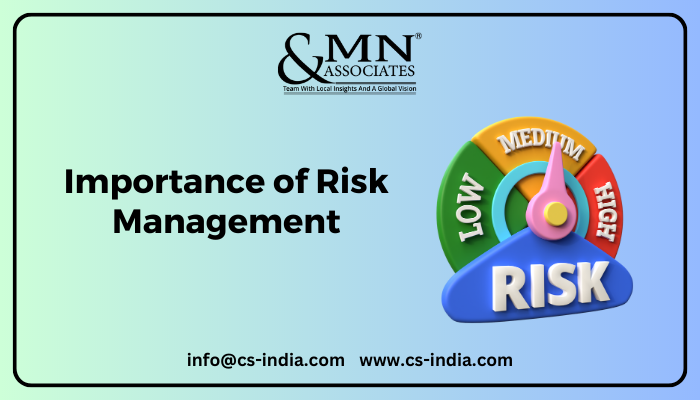Why the Importance of Risk Management Cannot Be Ignored in The Current Economy
Why the Importance of Risk Management Cannot Be Ignored in The Current Economy
Blog Article
Exploring the Significance of Risk Management for Effective Decision-Making Strategies
In the complex globe of business, Risk Management emerges as an important factor in the decision-making process. The capability to recognize potential hazards and opportunities, and plan as necessary, can spell the distinction in between success and failure.
Comprehending the Concept of Risk Management
Risk Management, a vital component in decision-making, is frequently misconstrued or oversimplified. Usually, it describes the identification, analysis, and prioritization of dangers to minimize, keep track of, and control the possibility or influence of unfortunate events. It's not merely regarding preventing negative end results, but additionally concerning acknowledging prospective possibilities. Risk Management involves regimented and structured approaches, making use of data and insightful analyses. It calls for a thorough understanding of the company's context, purposes, and the prospective dangers that might prevent them. From financial unpredictabilities, legal liabilities, critical Management mistakes, to mishaps and all-natural calamities, it resolves different dangers. Notably, reliable Risk Management is not stationary; it's a continuous, progressive process that advances with changing conditions.
The Duty of Risk Management in Decision-Making Processes
In the realm of critical planning and company procedures, Risk Management plays an integral function in decision-making processes. Risk Management thus comes to be an important device in decision-making, helping leaders to make enlightened selections based on a thorough understanding of the threats included. Risk Management serves as an important part in the decision-making procedures of any type of company.

Exactly How Risk Management Boosts Strategic Planning
In the context of tactical planning, Risk Management plays a pivotal duty. Starting with the identification of potential threats, it better includes the application of Risk reduction procedures. The function of Risk Management is dynamic however not fixed, as it demands constant monitoring and adjusting of approaches.
Determining Prospective Risks

Implementing Risk Reduction
Having actually developed the value of recognizing potential dangers, the following action is to discover Risk reduction. This procedure includes establishing and carrying out methods to take care of determined dangers successfully. It is a critical facet of critical preparation as it improves decision-making by lessening prospective unfavorable outcomes. Risk mitigation methods can vary from Risk evasion, Risk transfer, to take the chance of decrease. Each strategy must be customized to the specific Risk, considering its potential effect and the organization's Risk tolerance. In addition, reliable Risk mitigation needs a deep understanding of the Risk landscape and the potential effect of each Risk. This understanding makes it possible for organizations to prioritize risks and allot resources properly, making certain that one of the most substantial risks are dealt with initially.
Tracking and Changing Approaches
Though Risk reduction is a vital action in calculated additional info preparation, constant monitoring and adjustment of these strategies is just as crucial. This ongoing process enables organizations to identify brand-new dangers and reassess existing ones, guaranteeing the implemented techniques stay effective in the ever-changing organization setting. It additionally gives a possibility to review the success of the Risk Management measures, enabling modifications to be made where essential, further boosting critical planning. Effective monitoring and change need the use of analytics and key efficiency signs (KPIs) to determine effectiveness. These devices provide important data-driven insights that can educate calculated decision-making. As a result, tracking and readjusting Risk Management techniques is an essential component for enhancing an organization's strength and strategic preparation.
Case Researches: Effective Risk Management and Decision-Making
In the globe of organization and finance, effective Risk Management and decision-making typically serve as the pillars of prosperous enterprises. These cases highlight the value of sharp Risk Management in decision-making procedures. These situations underscore the crucial role of Risk Management resource in calculated decision-making.
Tools and Strategies for Reliable Risk Management
These devices, such as Risk registers and heat maps, aid in determining and assessing potential dangers. Risk action strategies, a key component of Risk Management, involve accepting, avoiding, transferring, or mitigating risks. With these techniques and tools, decision-makers can navigate the complex landscape of Risk Management, therefore facilitating educated and reliable decision-making.
Future Fads in Risk Management and Decision-Making Techniques
As we check out the substantial landscape of Risk Management, it ends up being noticeable that the tools and techniques utilized today will certainly continue to advance. The idea of Risk culture, where every member of a company is aware and entailed in Risk Management, will certainly obtain extra prominence. These patterns proclaim an even more try this web-site proactive and comprehensive strategy in the direction of Risk Management and decision-making.
Verdict

Risk Management thus comes to be an important tool in decision-making, aiding leaders to make enlightened selections based on a comprehensive understanding of the dangers included. Risk reduction approaches can vary from Risk evasion, Risk transfer, to risk reduction (importance of risk management). Effective Risk reduction needs a deep understanding of the Risk landscape and the possible effect of each Risk. Risk action approaches, a vital element of Risk Management, involve accepting, avoiding, transferring, or mitigating risks. The principle of Risk culture, where every member of an organization is mindful and included in Risk Management, will certainly get a lot more prominence
Report this page